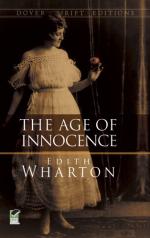“Her uncles ought to deal with this,” he said.
“They have. The matter has been gone into by the family. They are opposed to the Countess’s idea; but she is firm, and insists on a legal opinion.”
The young man was silent: he had not opened the packet in his hand.
“Does she want to marry again?”
“I believe it is suggested; but she denies it.”
“Then—”
“Will you oblige me, Mr. Archer, by first looking through these papers? Afterward, when we have talked the case over, I will give you my opinion.”
Archer withdrew reluctantly with the unwelcome documents. Since their last meeting he had half-unconsciously collaborated with events in ridding himself of the burden of Madame Olenska. His hour alone with her by the firelight had drawn them into a momentary intimacy on which the Duke of St. Austrey’s intrusion with Mrs. Lemuel Struthers, and the Countess’s joyous greeting of them, had rather providentially broken. Two days later Archer had assisted at the comedy of her reinstatement in the van der Luydens’ favour, and had said to himself, with a touch of tartness, that a lady who knew how to thank all-powerful elderly gentlemen to such good purpose for a bunch of flowers did not need either the private consolations or the public championship of a young man of his small compass. To look at the matter in this light simplified his own case and surprisingly furbished up all the dim domestic virtues. He could not picture May Welland, in whatever conceivable emergency, hawking about her private difficulties and lavishing her confidences on strange men; and she had never seemed to him finer or fairer than in the week that followed. He had even yielded to her wish for a long engagement, since she had found the one disarming answer to his plea for haste.
“You know, when it comes to the point, your parents have always let you have your way ever since you were a little girl,” he argued; and she had answered, with her clearest look: “Yes; and that’s what makes it so hard to refuse the very last thing they’ll ever ask of me as a little girl.”
That was the old New York note; that was the kind of answer he would like always to be sure of his wife’s making. If one had habitually breathed the New York air there were times when anything less crystalline seemed stifling.
The papers he had retired to read did not tell him much in fact; but they plunged him into an atmosphere in which he choked and spluttered. They consisted mainly of an exchange of letters between Count Olenski’s solicitors and a French legal firm to whom the Countess had applied for the settlement of her financial situation. There was also a short letter from the Count to his wife: after reading it, Newland Archer rose, jammed the papers back into their envelope, and reentered Mr. Letterblair’s office.
“Here are the letters, sir. If you wish, I’ll see Madame Olenska,” he said in a constrained voice.




